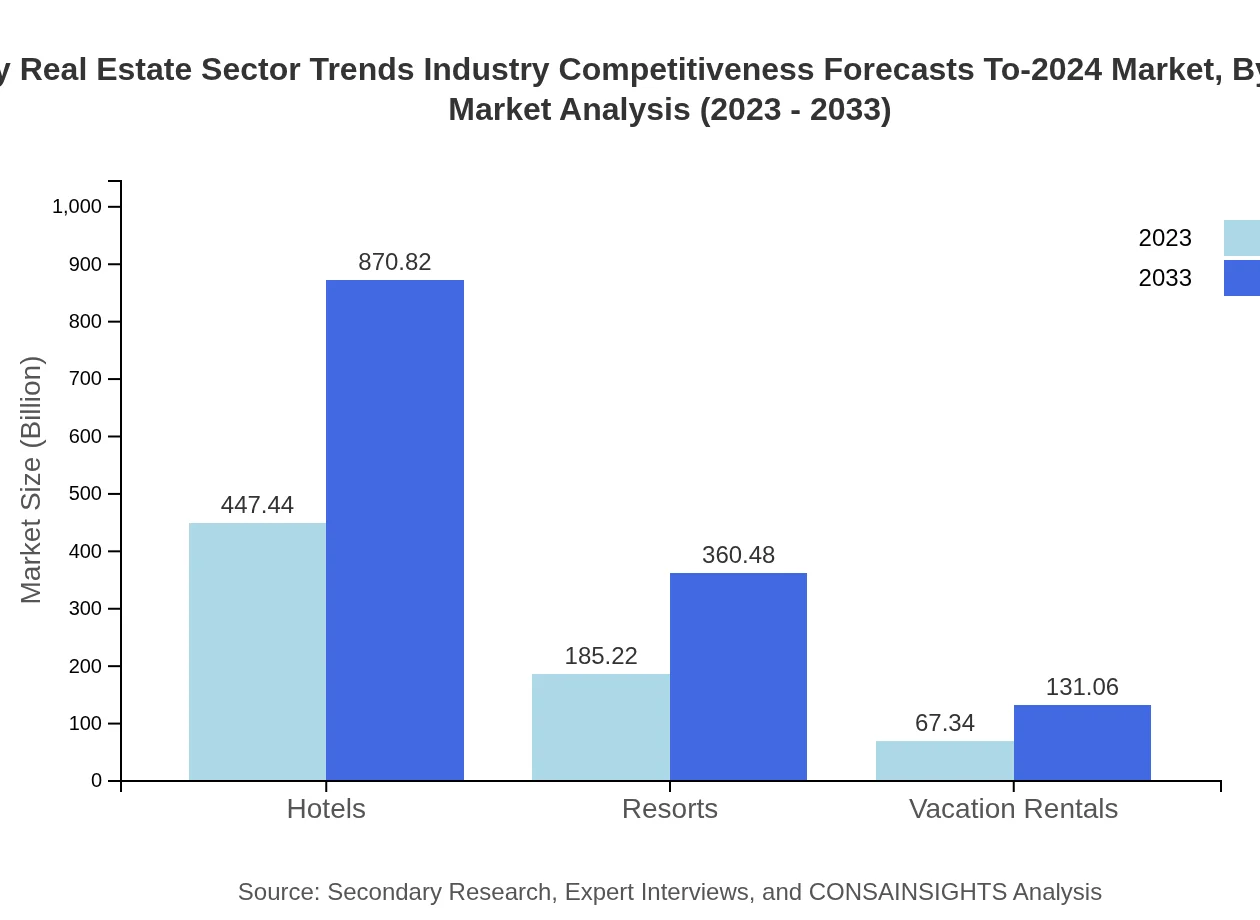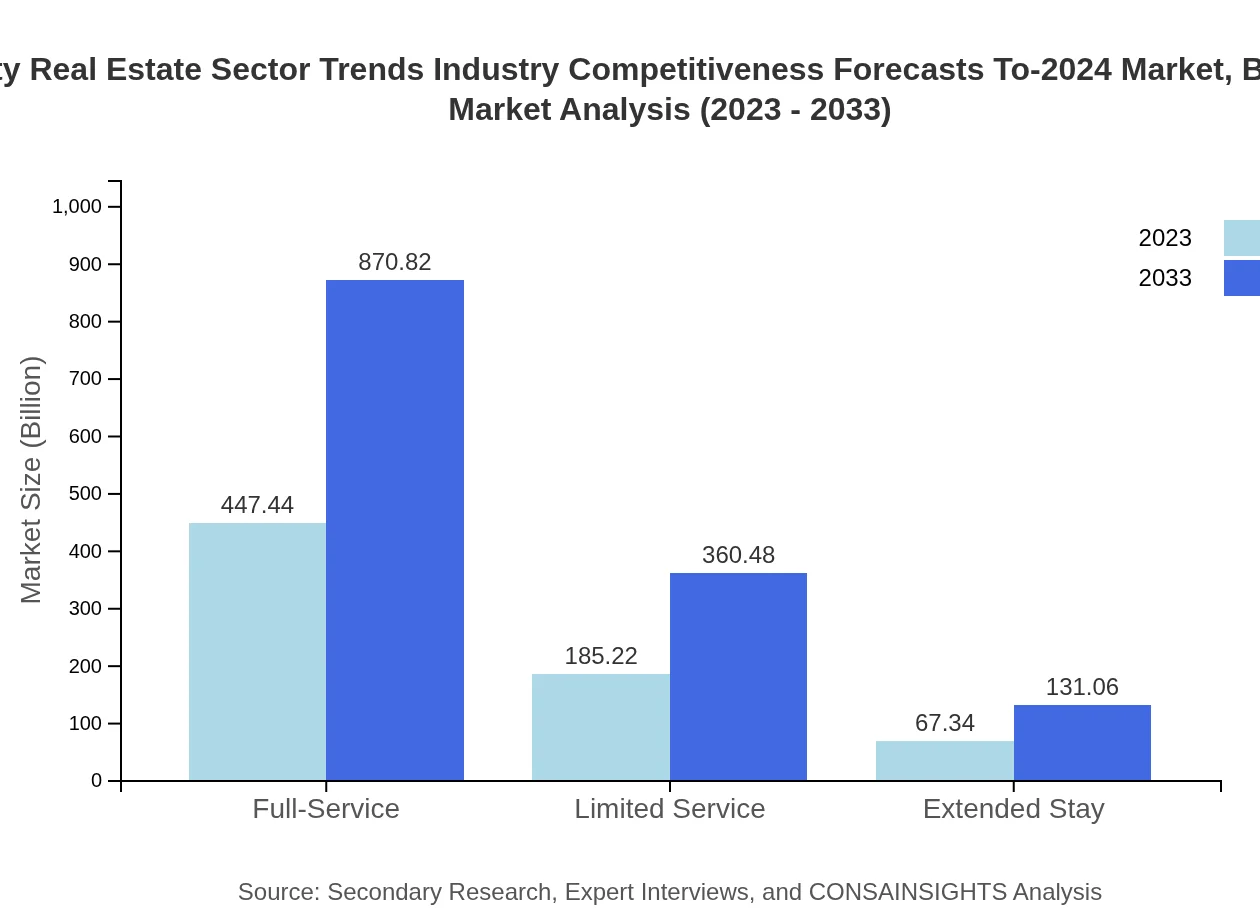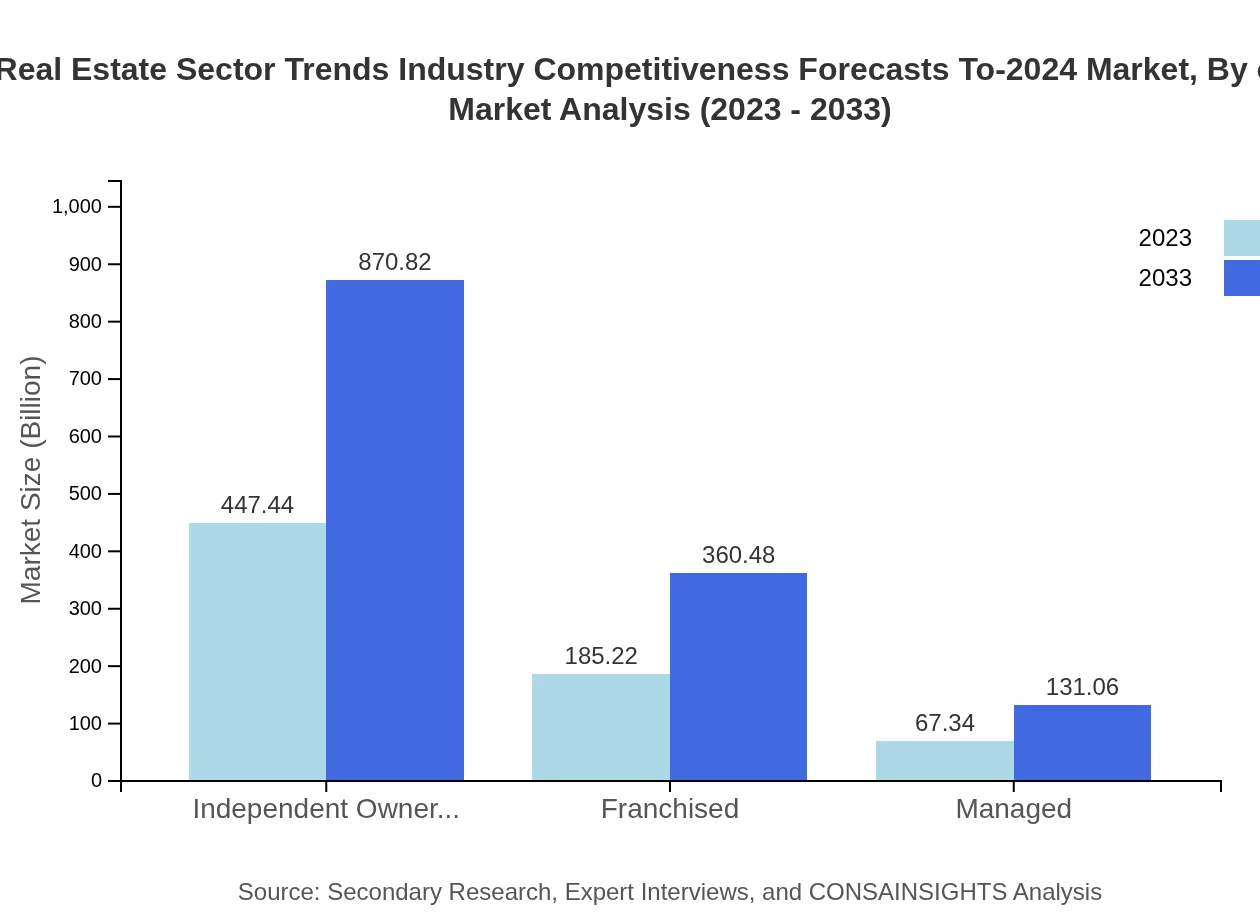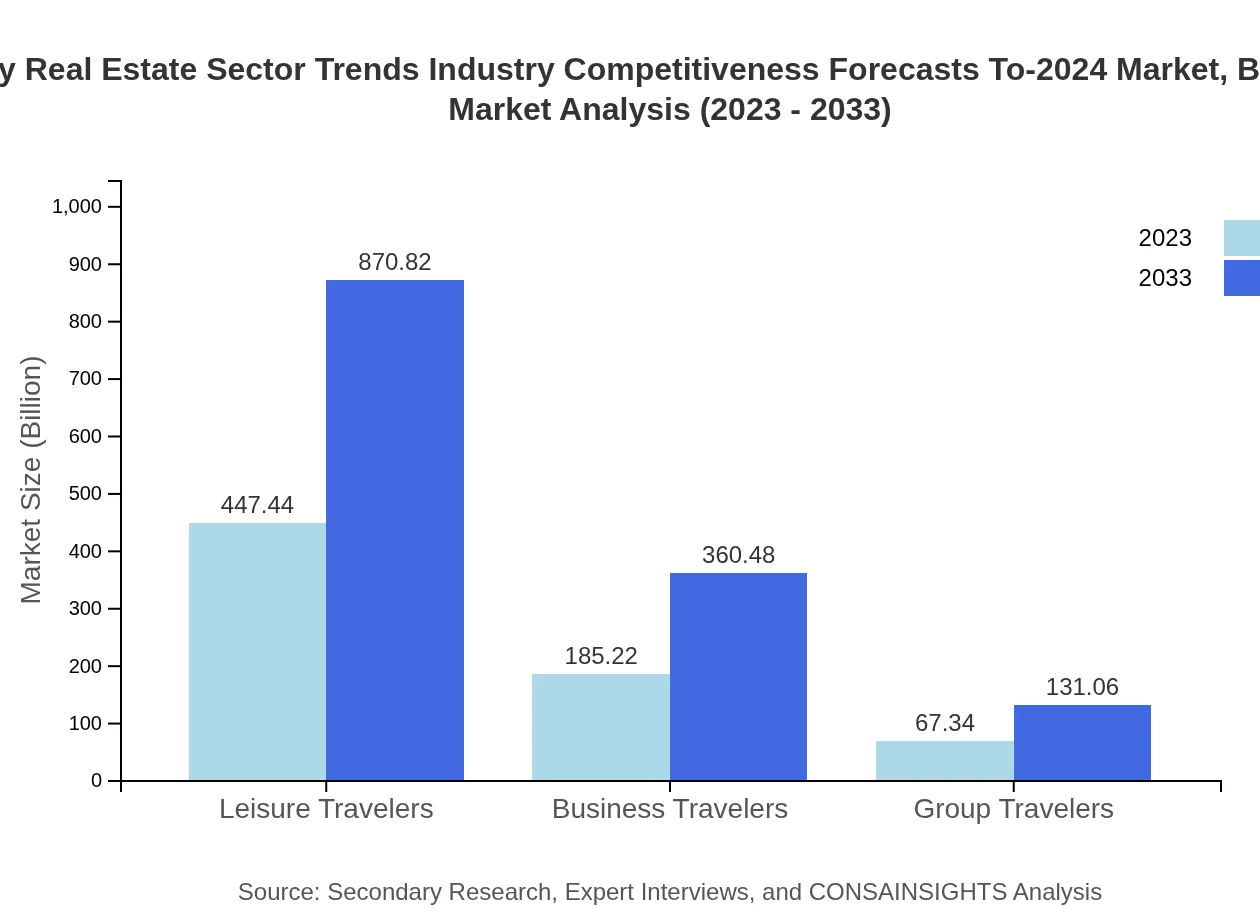Hospitality Real Estate Sector Trends Industry Competitiveness Forecasts To-2024 Market Report
Published Date: 22 January 2026 | Report Code: hospitality-real-estate-sector-trends-industry-competitiveness-forecasts-to-2024
Hospitality Real Estate Sector Trends Industry Competitiveness Forecasts To-2024 Market Size, Share, Industry Trends and Forecast to 2033
This report provides a comprehensive analysis of the Hospitality Real Estate sector, focusing on industry trends, competitive landscape, and future forecasts up to 2033. Insights include market size, growth projections, segmentation, and regional performance, vital for understanding the evolving landscape.
| Metric | Value |
|---|---|
| Study Period | 2023 - 2033 |
| 2023 Market Size | $700.00 Billion |
| CAGR (2023-2033) | 6.7% |
| 2033 Market Size | $1362.35 Billion |
| Top Companies | Marriott International, Hilton Worldwide, InterContinental Hotels Group (IHG) |
| Last Modified Date | 22 January 2026 |
Hospitality Real Estate Sector Trends Industry Competitiveness Forecasts To-2024 Market Overview
Customize Hospitality Real Estate Sector Trends Industry Competitiveness Forecasts To-2024 Market Report market research report
- ✔ Get in-depth analysis of Hospitality Real Estate Sector Trends Industry Competitiveness Forecasts To-2024 market size, growth, and forecasts.
- ✔ Understand Hospitality Real Estate Sector Trends Industry Competitiveness Forecasts To-2024's regional dynamics and industry-specific trends.
- ✔ Identify potential applications, end-user demand, and growth segments in Hospitality Real Estate Sector Trends Industry Competitiveness Forecasts To-2024
What is the Market Size & CAGR of Hospitality Real Estate Sector Trends Industry Competitiveness Forecasts To-2024 market in 2024?
Hospitality Real Estate Sector Trends Industry Competitiveness Forecasts To-2024 Industry Analysis
Hospitality Real Estate Sector Trends Industry Competitiveness Forecasts To-2024 Market Segmentation and Scope
Tell us your focus area and get a customized research report.
Hospitality Real Estate Sector Trends Industry Competitiveness Forecasts To-2024 Market Analysis Report by Region
Europe Hospitality Real Estate Sector Trends Industry Competitiveness Forecasts To-2024 Market Report:
Europe's hospitality market, valued at 220.92 billion USD in 2023, is projected to grow to 429.96 billion USD by 2033. Growth factors include a rebound in international travel and heightened demand for diverse accommodation types across major tourist destinations.Asia Pacific Hospitality Real Estate Sector Trends Industry Competitiveness Forecasts To-2024 Market Report:
The Asia Pacific region is projected to grow significantly from 133 billion USD in 2023 to 258.85 billion USD by 2033, driven by rapidly expanding middle class populations and increased international tourist arrivals. The region is witnessing a surge in luxury hotel developments, catering to both leisure and business travelers.North America Hospitality Real Estate Sector Trends Industry Competitiveness Forecasts To-2024 Market Report:
North America holds a prominent position with a market size of 241.08 billion USD in 2023, expected to reach 469.19 billion USD by 2033. The robust economic recovery post-pandemic, along with rising domestic travel, underlines the significance of the hospitality sector in this region.South America Hospitality Real Estate Sector Trends Industry Competitiveness Forecasts To-2024 Market Report:
South America’s market is expected to rise from 33.25 billion USD in 2023 to 64.71 billion USD by 2033. The growth is facilitated by improving infrastructure and the burgeoning ecotourism sector, contributing to the regional hospitality market’s expansion.Middle East & Africa Hospitality Real Estate Sector Trends Industry Competitiveness Forecasts To-2024 Market Report:
The Middle East and Africa are set to grow from 71.75 billion USD in 2023 to 139.64 billion USD by 2033, propelled by continued investments in tourism infrastructure and a focus on attracting global events and business travel.Tell us your focus area and get a customized research report.
Hospitality Real Estate Sector Trends Industry Competitiveness Forecasts To-2024 Market Analysis By Property Type
In 2023, the full-service segment is a significant market contributor valued at 447.44 billion USD, projected to grow to 870.82 billion USD by 2033. Limited service and resorts also show notable growth, reflecting changing consumer preferences towards affordability and experience.
Hospitality Real Estate Sector Trends Industry Competitiveness Forecasts To-2024 Market Analysis By Service Type
The service type segment is dominated by full-service hotels, which account for 63.92% of the market share in 2023, remaining stable over the decade as they continue to provide comprehensive amenities catering to diverse traveler needs.
Hospitality Real Estate Sector Trends Industry Competitiveness Forecasts To-2024 Market Analysis By Ownership Model
Independent ownership currently leads the ownership model segment with a market size of 447.44 billion USD in 2023, maintaining a share of 63.92%. Franchised models account for 26.46%, highlighting the ongoing appeal of brand affiliation in consumer choices.
Hospitality Real Estate Sector Trends Industry Competitiveness Forecasts To-2024 Market Analysis By Target Market
Leisure travelers account for a major portion of the market, valued at 447.44 billion USD in 2023 and projected to rise consistently. Business and group travelers show a growth trajectory as organizations resume travel activities.
Hospitality Real Estate Sector Trends Industry Competitiveness Forecasts To-2024 Market Trends and Future Forecast
Tell us your focus area and get a customized research report.
Global Market Leaders and Top Companies in Hospitality Real Estate Sector Trends Industry Competitiveness Forecasts To-2024 Industry
Marriott International:
One of the world’s largest hotel chains, Marriott focuses on providing exceptional service across various luxury brands, continuously expanding their portfolio globally.Hilton Worldwide:
A leading global brand in the hospitality industry, Hilton is recognized for its innovative guest services and a commitment to sustainability initiatives across its hotels.InterContinental Hotels Group (IHG):
With a diverse range of hotel brands, IHG emphasizes quality service and recognition programs that enhance customer loyalty and satisfaction.We're grateful to work with incredible clients.









FAQs
What is the market size of hospitality Real Estate Sector Trends Industry Competitiveness Forecasts To-2024?
The hospitality real estate sector is currently valued at approximately $700 billion, exhibiting a compound annual growth rate (CAGR) of 6.7% from 2023 to 2024. The market is projected to expand significantly in the forthcoming years.
What are the key market players or companies in this hospitality Real Estate Sector?
Key players in the hospitality real estate sector include major hotel chains, real estate investment trusts (REITs), and developers such as Marriott, Hilton, and InterContinental Hotels Group, among other prominent firms that drive market competitiveness.
What are the primary factors driving the growth in the hospitality Real Estate Sector?
Growth in the hospitality real estate sector is primarily driven by rising travel demand, increasing disposable income, urbanization, and the expansion of tourism infrastructure, which collectively boost occupancy rates and investment opportunities.
Which region is the fastest Growing in the hospitality real estate sector?
In the hospitality real estate sector, Asia Pacific is currently the fastest-growing region. Market size is expected to grow from $133 billion in 2023 to approximately $258.85 billion by 2033, reflecting a strong economic upturn.
Does ConsaInsights provide customized market report data for the hospitality Real Estate Sector?
Yes, ConsaInsights offers customized market report data tailored to specific needs within the hospitality real estate sector. This enables stakeholders to obtain detailed insights relevant to their unique business scenarios and strategies.
What deliverables can I expect from this hospitality Real Estate Sector market research project?
Upon completion of the market research project, deliverables include comprehensive reports, detailed market analyses, forecasts, competitive landscapes, and strategic recommendations tailored for the hospitality real estate sector.
What are the market trends of hospitality Real Estate Sector?
Key market trends include a shift towards sustainable practices, increased investment in technology like smart hotel solutions, and a growing preference for unique lodging experiences that cater to evolving traveler preferences.





